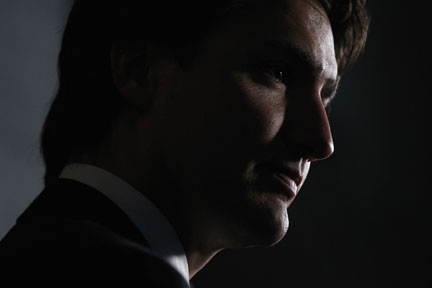Liberal Party leader Justin Trudeau, fighting to unseat Conservative Prime Minister Stephen Harper in the 2015 election, expelled all his party's members in the scandal-plagued Senate from the Liberal caucus on Wednesday.
 The reputation of Canada's unelected Senate is in tatters after controversial expense claims by four senators - three Conservative appointees and one Liberal appointee.
The reputation of Canada's unelected Senate is in tatters after controversial expense claims by four senators - three Conservative appointees and one Liberal appointee.
Opponents of Trudeau, son of former Prime Minister Pierre Elliott Trudeau, said his motive was to insulate his party from the seething expense scandal. But the Liberal leader said he was moving to fix what he called a broken Senate.
"Paired with patronage, the pervasive issue of partisanship and control in the Senate is a deeply negative force. We need immediate action to address this," Trudeau told reporters in front of the House of Commons.
Until now, the National Liberal Caucus, which meets to discuss policy and strategy every Wednesday when Parliament is in session, has included Liberal members of both the House and the Senate.
The 32 Liberal senators will no longer be included and Trudeau said they will now sit as independents in the upper chamber. He challenged his Conservative opponents to match his gesture.
Government Auditor General Michael Ferguson is examining all senators' expenses. There is fear in both the Liberal and Conservative parties that more potential scandals could emerge.
"Mr Trudeau has announced a smokescreen to distance himself from the auditor general's report," said Conservative Pierre Poilievre, a junior minister in charge of democratic reform.
The expense scandal dominated Canadian political news in 2013, with allegations of wrongdoing reaching right into the prime minister's office and putting Harper on the defensive. It has been a factor in the Liberal Party keeping a comfortable lead in public opinion polls.
Trudeau acknowledged that Canadians had big concerns about Senate expenses but said his move was not about that.
"This is about changing the nature of the Senate away from being a place of partisanship and patronage and improving its capacity to serve Canadians in a way they expect to be served," Trudeau told reporters.
The official opposition in the House of Commons, the New Democratic Party, immediately pointed out that Trudeau had voted against an NDP motion just last October which called for an end to senators' participation in party caucus meetings.
Trudeau said he recognized that he was losing almost half of his caucus, which up until today had 36 members of Parliament and 32 senators. Experienced Liberal political operatives in the Senate include David Smith, who chaired the Liberals' winning election campaigns in 1993, 1997, and 2000.
The next general election is scheduled for Oct. 19, 2015, unless Harper, who has been prime minister since 2006, decides to call an earlier vote.
 The reputation of Canada's unelected Senate is in tatters after controversial expense claims by four senators - three Conservative appointees and one Liberal appointee.
The reputation of Canada's unelected Senate is in tatters after controversial expense claims by four senators - three Conservative appointees and one Liberal appointee.Opponents of Trudeau, son of former Prime Minister Pierre Elliott Trudeau, said his motive was to insulate his party from the seething expense scandal. But the Liberal leader said he was moving to fix what he called a broken Senate.
"Paired with patronage, the pervasive issue of partisanship and control in the Senate is a deeply negative force. We need immediate action to address this," Trudeau told reporters in front of the House of Commons.
Until now, the National Liberal Caucus, which meets to discuss policy and strategy every Wednesday when Parliament is in session, has included Liberal members of both the House and the Senate.
The 32 Liberal senators will no longer be included and Trudeau said they will now sit as independents in the upper chamber. He challenged his Conservative opponents to match his gesture.
Government Auditor General Michael Ferguson is examining all senators' expenses. There is fear in both the Liberal and Conservative parties that more potential scandals could emerge.
"Mr Trudeau has announced a smokescreen to distance himself from the auditor general's report," said Conservative Pierre Poilievre, a junior minister in charge of democratic reform.
The expense scandal dominated Canadian political news in 2013, with allegations of wrongdoing reaching right into the prime minister's office and putting Harper on the defensive. It has been a factor in the Liberal Party keeping a comfortable lead in public opinion polls.
Trudeau acknowledged that Canadians had big concerns about Senate expenses but said his move was not about that.
"This is about changing the nature of the Senate away from being a place of partisanship and patronage and improving its capacity to serve Canadians in a way they expect to be served," Trudeau told reporters.
The official opposition in the House of Commons, the New Democratic Party, immediately pointed out that Trudeau had voted against an NDP motion just last October which called for an end to senators' participation in party caucus meetings.
Trudeau said he recognized that he was losing almost half of his caucus, which up until today had 36 members of Parliament and 32 senators. Experienced Liberal political operatives in the Senate include David Smith, who chaired the Liberals' winning election campaigns in 1993, 1997, and 2000.
The next general election is scheduled for Oct. 19, 2015, unless Harper, who has been prime minister since 2006, decides to call an earlier vote.







